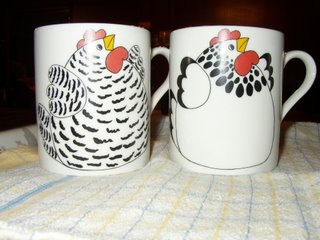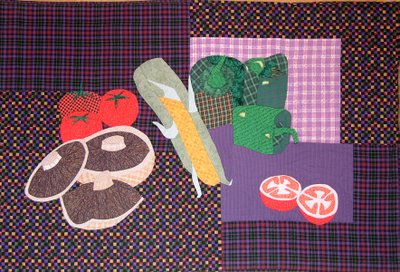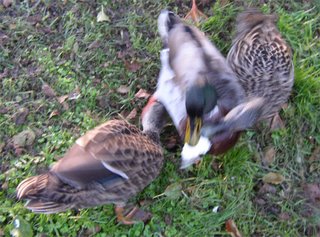This week's prompt for Sunday Scribblings was three wishes. If I was granted three wishes, what would they be? I'm not revealing that - I suspect my dearest wishes are rather private. Instead I offer this rather hastily written story. Yes, it is entirely fiction. Usual disclaimer "the characters in this story...blah,blah" I hope you find it entertaining. More Sunday Scribblings are to be found
hereIt was one of those days . I had everything timed to perfection. George was bringing an important client home to dinner. I planned to leave work early and stop at the deli for one of their wonderful salads, steaks from the supermarket, flowers for the table arrangement and the special bottle of wine that George had asked for. Then I would just have time for a shower and to slip into a fabulous dress, after I had put the finishing touches to my trademark tiramisu.
Only the computers crashed at work, and I had just got them running again when my boss looked in and said “Have you finished that report? My meeting has been moved up to tomorrow morning, so I need you to work late.” He was less than pleased when I told him I couldn’t stay late. I had to promise to be there at 7a.m. to make sure it was finished in time. I knew I’d feel terrible after staying up late laughing at the pompous client’s bad jokes and drinking too much red wine, but there was no choice.
And then when I got home George looked at the wine and said “That’s not right. Where’s the one I asked for?”
“I’m sorry, I grabbed it in a hurry, I must have picked up the one next to it on the shelf. Won’t that do?”
“No, it won’t. You’ll have to go back and get the right one. It’s his favourite, and I really want to land this deal”.
So there I was in the check out queue, running late, and the little old lady in front of me was short of money. She scrabbled in her purse and counted out every coin she had.
“I’m sorry, you’re still ten dollars short”.
“Oh, well let me see…If I get only two tins of cat food…”
“No, you’d still be five dollars short”.
“Well..” she dithered, and I could see she was going to take forever.
“I’ll pay the extra” I offered.
“Oh no, I couldn’t.”
”You really could” I replied. “Pass the favour on to someone else one day.”
‘Well then, if you’re sure…”
I was thinking that ten dollars was worth it to get back on time. As I paid for the wine, she dropped her bag of groceries in front of me. Tins of cat food and baked beans were rolling everywhere. People were stepping round her as she scrabbled to pick it up. I sighed, and bent down to help.
“Oh thank you”, she said. “You’re such a kind person, I’m going to give you three wishes”.
I shot her a funny look. “No really”, she said. “I’m a fairy”.
“You don’t look like a fairy.”
“What did you think I’d look like? Two feet tall with wings? We look just like everyone else, you know, otherwise it would be too easy. Now, what do you wish for?”
I can’t say why, but somehow I believed her. George and I had talked about this, a long time ago. Maybe it was the Irish in him that made him consider the possibility. And the English that had come up with such a practical list. I had written it down and stuffed it in a corner of my purse, just in case I ever needed it. Did I half believe in the possibility myself, even then? So, where was it now? I hunted in the corners of my purse…sunglasses, driver’s license… where was it?
“Well? I haven’t got all day” she said, sharply.
Just then there was a commotion behind me. A mother was yelling at her small boy to hurry up. He was clearly tired. Probably she had picked him up from day care after work and they were on their way home. Well, she was tired too, I thought. A shame, but it’s so easy to get short-tempered when you’re so busy. But then she started laying into him with her fist. I was shocked.
“I wish someone would give her the chance to know what that feels like” I muttered. Long ago memories were stirring..
“Done” said the fairy.
I was startled. “Oh, is that the first one? Darn. I’ve wasted it…No, I haven’t! That’s a good use for it. But nothing’s happening!”
“Oh, she’ll have
very bad dreams for the next few weeks. Very
vivid dreams. So vivid, they’ll seem real. She’ll change her ways. Now, what about the next one?”
I’d found the list. I was just about to look at it when I saw my neighbour. She looked warn out. No wonder – she had four small children, and one of them was ill with leukaemia. She had been in remission, but I saw an ambulance there the other day, and I had heard she was ill again.
“I wish that my neighbour’s daughter was cured” I said. I still had one wish left, surely I could do something with that. A million dollars would set us up nicely.
“Done” I wondered – where was the evidence? So far I had no proof that the wishes had really been granted.
“I know what you’re thinking. Just be patient, you’ll see. Now – what about the last one?”
I had found the list. I looked at George’s dreams. A round the world trip, visiting his ancestral lands in England. A mansion. A race horse guaranteed to win huge stakes, and to sire many more winners. Which one would make him happiest?
I tore up the list and looked for a rubbish bin, but I couldn’t see one. I stuffed the pieces in my pocket.
“OK, let me think. This is not a wish, until I say ‘I wish’. I’m just thinking aloud here. What I really want….what I want is to leave him. I need a small cottage, nothing grand, and enough money invested to almost live on the interest, not quite. I want to write. I want to earn money from my writing, and it will be slow at first, but if I have to much I’ll have no incentive. So, just enough to almost live on. Very modestly. I wish for a country cottage in good repair and enough money to almost live on.”
“Well, technically, that’s two” she said. “But you get a bonus for using the first two to help others. So I’ll stretch the rules a bit. Done”
She disappeared suddenly. I blinked. She must have slipped away in the crowd. I went home with the wine. “What took you so long?” George asked. I was about to answer, but he wasn’t really listening. He hurried off to finish getting ready. I didn’t have time to change. I had just put the tiramisu in the fridge when the door bell rang. The client was as pompous as ever. I got to bed late and had a headache when the alarm went off in the morning. By the time I had finished the proposal, just in time for my boss’s meeting, I had almost forgotten about the strange old lady.
Until an envelope arrived in the mail the following week. It was from a firm of lawyers in the North Island. I was surprised. I was even more surprised when I opened it and found that a great-aunt who I only vaguely remembered had died and left me her property. A cottage in the country, and a small trust fund.
George was excited. “Of course we’ll sell it”, he said. “Property prices have gone up so much lately. Of course it’s in the country so it won’t be worth as much, but there would be enough to go on that trip I’ve always wanted, or to buy a racehorse”.
“Forget it. George, I’m leaving”
He just stared at me, open-mouthed. I don’t think he thought I would do it, but here I am. This is my first story, and it’s all true. I have plenty more lined up to follow. And George? Oh, he married his secretary. Didn’t take him long at all.
Am I happy ever after? Of course not. You have to work at your happiness – mostly happy, most days, will do for me.
























